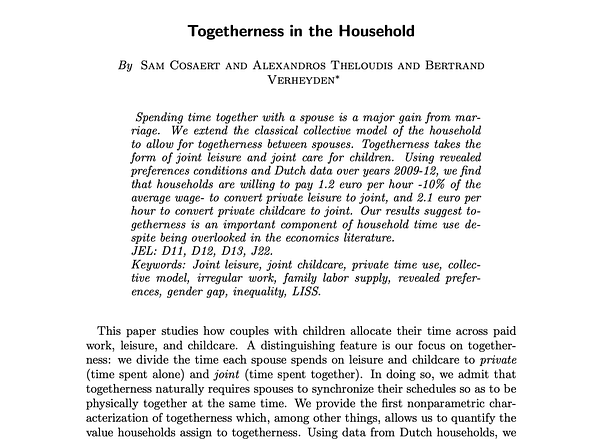Best of #econtwitter - Week of June 19, 2022 [1/3]
Welcome readers old and new to this week’s edition of Best of Econtwitter. Thanks to those sharing suggestions, over email or on Twitter @just_economics.
This is part one of three.
Paper summaries

Thread on our survey on "A New Era in the Economics of Fertility."
Why a new era? Because everything has changed!
- The empirical regularities of fertility choice have reverted.
- The mechanisms emphasized by earlier research have lost relevance.
1/12


New fact #1:
- Fertility used to be decreasing in income.
- Now, among high-income countries, richer countries have higher fertility rates.
2/12


New fact #2:
- Fertility used to be decreasing in women's labor force participation.
- Now, among high-income countries, countries where more women work have higher fertility rates.
3/12

^“The career-family tradeoff” vs. quantity-quality. Related: in the US cross-section, more

Across 70+ RCTs run by @BITAmericas with US cities, we find that 27% of treatments are adopted by the gov. agency (you guessed 32%). But wait, there's more. What predicts adoption? Strength of evidence? Not really. Staff retention? Less important than we thought. (2/n)

Pritchett & Lewis defend economic growth as necessary AND sufficient for not just reducing poverty but also for meeting "everything basic to human material wellbeing."
lantpritchett.org/wp-content/upl… 1/3


👇 Fantastic summary-🧵by @j_schneebacher of "Structural Change Within versus Across Firms: Evidence from the United State" (@xiangxding, @Tfpiasecki, @ReddingEcon, @pkschott).
#EconTwitter at its best.



Jakob Schneebacher @j_schneebacher

We examine the impact of enrolling in schools that employ a highly-standardized approach to education. How? Random variation from a nationwide scholarship program. 20k+ applicants. 10k scholarships. 100s of schools. All primary+preprimary grade levels. Most counties in Kenya. 2/

I have a new paper out today in the Journal of Economic Methodology, on Judea Pearl's Structural Causal Modeling approach. I ask what the *marginal* (not absolute!) value of SCM is for economists, given we're already familiar with potential outcomes


Togetherness in the Household, forthcoming at @AEAjournals-Micro
Joint work with Sam Cosaert & Bertrand Verheyden
Excited to share it here:
aeaweb.org/articles?id=10…
And ungated: dropbox.com/s/7k0f9w36g1qt…
A short thread 🧵1/11
#EconTwitter


🚨New paper🚨
Our NBER WP (w/ @mattkahn1966 @SomikCities @rajatkochhar @VaidehiTandel) "Adapting to Flood Risk: Evidence from a Panel of Global Cities"
nber.org/papers/w30137
We use floods & night light for ~9500 cities
Result 1: Low-income countries suffer MORE from floods
1/n

Interesting discussions

Econ needs a shorter publishing process. As a referee, don't push authors to do every possible robustness test to show their story is the only plausible one. Encourage them to be more explicit on their limitations.
We need more refinement across papers and less within papers.

Forthcoming in the JEL: "Publishing Economics: How Slow? Why Slow? Is Slow Productive? How to Fix Slow?" by Aboozar Hadavand, Daniel S. Hamermesh, and Wesley W. Wilson.

^some old comments on this paper here, here, here; if someone wants to thread it…




